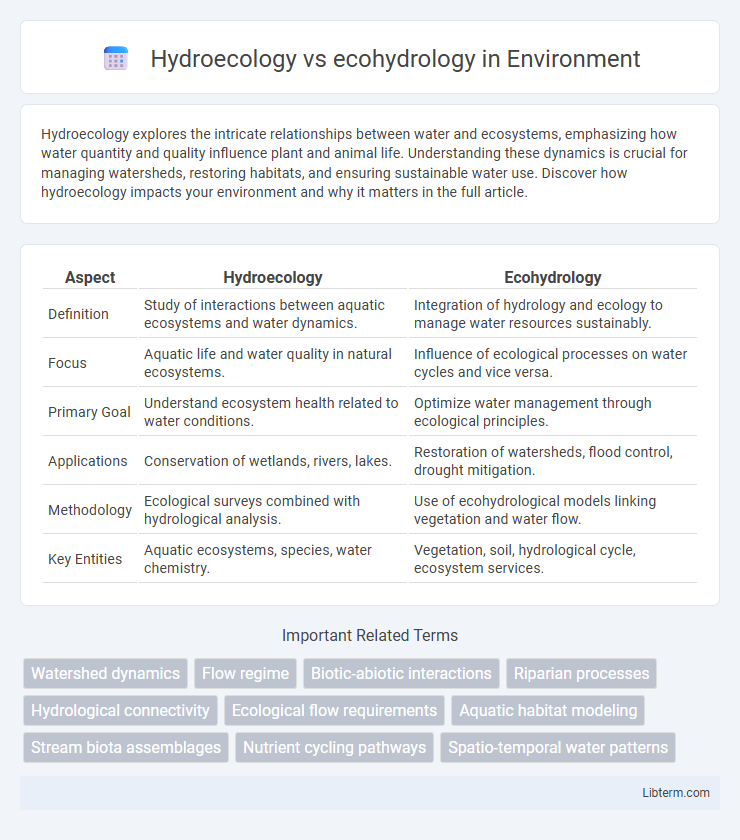Hydroecology explores the intricate relationships between water and ecosystems, emphasizing how water quantity and quality influence plant and animal life. Understanding these dynamics is crucial for managing watersheds, restoring habitats, and ensuring sustainable water use. Discover how hydroecology impacts your environment and why it matters in the full article.
Table of Comparison
| Aspect | Hydroecology | Ecohydrology |
|---|---|---|
| Definition | Study of interactions between aquatic ecosystems and water dynamics. | Integration of hydrology and ecology to manage water resources sustainably. |
| Focus | Aquatic life and water quality in natural ecosystems. | Influence of ecological processes on water cycles and vice versa. |
| Primary Goal | Understand ecosystem health related to water conditions. | Optimize water management through ecological principles. |
| Applications | Conservation of wetlands, rivers, lakes. | Restoration of watersheds, flood control, drought mitigation. |
| Methodology | Ecological surveys combined with hydrological analysis. | Use of ecohydrological models linking vegetation and water flow. |
| Key Entities | Aquatic ecosystems, species, water chemistry. | Vegetation, soil, hydrological cycle, ecosystem services. |
Introduction to Hydroecology and Ecohydrology
Hydroecology studies the interactions between water and ecological systems, emphasizing the influence of hydrological processes on aquatic and terrestrial ecosystems. Ecohydrology focuses on the reciprocal relationships between ecological patterns and hydrological dynamics, integrating water cycle components with ecosystem functions. Both fields aim to understand water's role in sustaining biodiversity, ecosystem services, and environmental resilience.
Defining Hydroecology: Scope and Focus
Hydroecology centers on the interactions between aquatic ecosystems and hydrological processes, emphasizing how water availability and quality influence biological communities and ecosystem functions. Its scope includes aquatic habitats, nutrient cycling, and the impacts of hydrological changes on biodiversity. This field integrates hydrology, ecology, and environmental science to understand and manage freshwater and wetland ecosystems effectively.
Understanding Ecohydrology: Principles and Objectives
Ecohydrology integrates ecological and hydrological processes to enhance ecosystem health and water resource management by studying water flow, distribution, and quality within ecological contexts. It aims to restore and maintain ecosystem functions through sustainable water management practices, emphasizing the interaction between vegetation, soil, and hydrological cycles. Understanding ecohydrology helps optimize water use, improve biodiversity conservation, and support climate resilience in diverse landscapes.
Key Differences Between Hydroecology and Ecohydrology
Hydroecology focuses on the interactions between aquatic organisms and their hydrological environment, emphasizing ecosystem dynamics within water bodies such as rivers, lakes, and wetlands. Ecohydrology integrates hydrological processes with ecological patterns and functions at watershed or landscape scales, often emphasizing water management and restoration based on ecological principles. Key differences include Hydroecology's focus on organism-hydrology relationships in aquatic systems versus Ecohydrology's broader approach linking hydrology and ecology to address ecosystem services and water resource sustainability.
Historical Development of Both Disciplines
Hydroecology emerged in the 1970s as a branch of ecology focusing on interactions between aquatic environments and living organisms, emphasizing water quality and ecosystem function. Ecohydrology was formalized in the 1990s, integrating hydrological processes with ecological dynamics to understand water distribution's impact on ecosystem structure and function. Both disciplines evolved from hydrology and ecology but differ in approach: hydroecology concentrates on biological responses to water conditions, whereas ecohydrology prioritizes feedback loops between water cycles and ecological processes.
Methodologies in Hydroecological Studies
Hydroecological studies employ integrated methodologies combining hydrological data analysis, ecological monitoring, and geospatial modeling to assess water flow impacts on ecosystems. Techniques such as remote sensing, in-situ water quality sampling, and ecohydraulics models help quantify habitat conditions and species responses. This multidisciplinary approach contrasts with ecohydrology's primary focus on the hydrological cycle's role in ecosystem function, emphasizing engineered water management and plant-water interactions.
Approaches in Ecohydrological Research
Ecohydrological research employs interdisciplinary methods combining hydrological modeling, ecological field studies, and biogeochemical analyses to understand the reciprocal interactions between water dynamics and ecosystem processes. It integrates spatial-temporal data through remote sensing and GIS technologies, facilitating the mapping of vegetation-water fluxes and soil moisture variability across landscapes. Experimental manipulations, such as tracer studies and flow regulation experiments, are utilized to quantify ecohydrological feedbacks and enhance predictive models of ecosystem responses to hydrological changes.
Applications in Environmental Management
Hydroecology examines interactions between aquatic ecosystems and hydrological processes to optimize water quality and biodiversity conservation, supporting wetland restoration and habitat management. Ecohydrology integrates ecological and hydrological dynamics to improve watershed management, enhance flood control, and promote sustainable water resource use. Both fields apply models and monitoring techniques for ecosystem resilience, but ecohydrology emphasizes feedback mechanisms between ecology and hydrology in environmental planning.
Synergies and Overlaps Between the Fields
Hydroecology and ecohydrology share significant synergies, both examining interactions between water and ecosystems to understand hydrological processes and ecological functions. Hydroecology emphasizes the influence of water on biological communities, while ecohydrology integrates ecological principles with hydrological cycles to manage and restore water-dependent ecosystems. The overlap lies in their joint focus on sustainable water resource management, biodiversity conservation, and ecosystem services, promoting interdisciplinary approaches for resilient environmental stewardship.
Future Perspectives in Water-Ecology Research
Hydroecology emphasizes the interactions between water processes and ecological systems, while ecohydrology integrates hydrological cycles with ecosystem functions to enhance sustainable resource management. Future perspectives in water-ecology research call for advanced modeling techniques and remote sensing technologies to predict ecological responses to hydrological changes under climate variability. Emphasizing interdisciplinary approaches and adaptive management strategies can optimize ecosystem services and biodiversity conservation amid evolving environmental challenges.
Hydroecology Infographic

 libterm.com
libterm.com